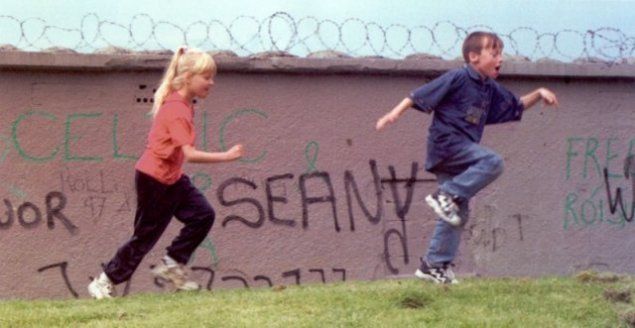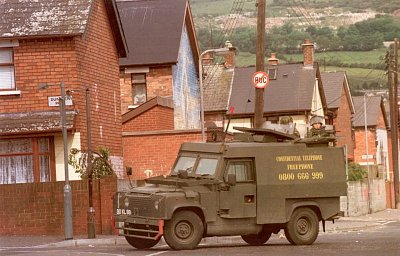
The Northern Ireland Religion Conflict

How is the life of the young people in Northern Ireland where faith becomes
conflict with blood and death on the urban streets?
The Irish conflict is a very complicated situation where
religious and political factors are mixed, and where the national identity provokes bravery and rage…
But what are the consequences of this climate of tension and fear?
The children who live with this conflict, do not merely react to its presence, but interpret the conflict and what it means to them personally, and in relation to their families (or in a communal scenario, to their respective communities).
But hardened by constant conflict, many teens in Northern Ireland are losing hope of seeing peace.
The follow text reports the opinions, the worries of the young about a violent event in the summer of 1994
------------------------
In the summer of 1994, a cease-fire in Northern Ireland had just begun. Peace talks were underway.
Teen-agers Andrew Hanna and Catherine Fawcett were hopeful the violent conflict between pro-British and pro-Irish forces would end. A London bombing shattered the peace 17 months later.
Y-Press, an Irish newspaper interviewed Andrew and Catherine in 1994 and again this summer, just before the latest peace talks were announced.
Their hopes had faded.
The irish newspaper had read about the segregated neighborhoods of Belfast kept apart by peace walls -- huge structures made of corrugated-iron and barbed wire or shorter walls meant to be more attractive.
But we didn't expect to see barbed wire on schools, churches and playgrounds.
We expected to see British troops, but we didn't expect for them to so readily point automatic weapons at people walking down the street.
And we expected children to have more hope for the future of their country.
What follows are excerpts from a wide range of interviews with children from all walks of life.

British armored vehicles are a common sight on the streets of Belfast, the capital of Northern Ireland. This one is on Berwick Road in the Catholic neighborhood of Ardoyne.
The Troubles
Andrew Hanna, 17, non-Catholic
"Some people would say (the conflict is over) the land. Some people would say it has to do with economy. Some people would say it has to do with the differences between Catholics and Protestants. Some would say it's between Unionists and Nationalists."
"I prefer to look at it as there's Unionists and Nationalists -- people who want Northern Ireland to stay part of Great Britain and people who want it to become (part of Ireland). There'll always be Traditionalists, people who won't forget the past. I think there'll be a shift away from the religious aspect. I don't know (which side to take). I suppose Unionist because Northern Ireland is a relatively prosperous place."
"It's both sides...that are shooting and bombing. I would look at it as terrorists, really; whether they're Catholic or Protestant, it doesn't really matter."
Rosemary Sarrign, 14, Catholic
"People who are older than us think that that's the only way to go and that violence is the only way you're gonna solve things, which is stupid. My mom and daddy don't really like the Troubles, but my uncles do."
"Britain has done a lot for Ireland. I think they should give (the country) to us, but I don't think it should be violence that will bring it about."
Bobby Moore, 18, Protestant
"Catholics hate Protestants. Protestants hate Catholics. It's sort of a love-hate relationship, but there is no love."
"I wouldn't move to England (if the Catholics were in power). I would stand and fight for our country."
Effect on daily life
Catherine Fawcett, 16, Protestant
"I feel safe and secure where I am living because I know in the back of my mind that I have no threat. My house is not threatened by anything."
"I've never really felt threatened here because I can walk into a Catholic area or a Protestant area and still feel the same. I really don't need to get away from the Troubles. The only reason I would move to England is for my family."
"It's still quiet. There was a car bomb on the Lisburn Road, and that's like the only bomb I know of in Northern Ireland since the cease-fire's been broken."
Sheena Morris, 15, Catholic
"There'd just be one problem (in Crossmaglen) -- the helicopters. They drop off the police."
"Every day, every minute, all night. I can't get to sleep. It's very annoying. You just say, 'Oh, God, I'm gonna kill them the next time I hear a helicopter. I'm just gonna go out and roar."
"From the helicopters, they take pictures. They're that close to our house. We can see the soldiers, and they have cameras and the guns and everything."
"(The school) is double-glassed. But you can still hear the helicopters. In the mobiles (portable classrooms) it is very noisy."
Claran Fairmichael, 16, mixed religion
"A taxi driver was pulling out and somebody came along on a motorcycle and shot him. He survived. It wasn't too bad."
"What a shock, really"
"But you learn to live with it. You become desensitized. I'd like to see myself separate. I don't want to be viewed as somebody from Northern Ireland of the Troubles."
"I live in southeast Belfast, which is particularly calm for Belfast. It's a mixed area."
"Belfast is not as bad as it seems. Belfast is a good city. I enjoy living here. It has parks; it has all the normal stuff. It has communities, although they're divided. They can be friendly."
Samantha Doherty, 18, Catholic
"My brother went for a job interview recently. They asked him his name. They can tell (your religion) just by your name. He was wearing a cross and he said his name. They just looked at him and said, 'No, you're not what we're looking for."
"I wasn't surprised. I was annoyed because he really needs a job, and it's not like he's gonna get anything either. It's just typical."
"With the majority of Catholics in Derry, there's a lot of unemployment. Look at the other side of the river. It's predominantly Protestants and Unionists. There's a lot of wealth there."
Bobby Moore
"We throw bricks, bottles, petrol bombs, anything we can get our hands on."
"It's just the point of trying to hurt them. They would do the same thing to us. We go down to the bottom of our road and there's nothing but a 25- or 30-foot distance that keeps us apart."
Andrew Hanna
"Before the (1994) cease-fire, there were many more shootings, bombs, that sort of thing. It affected my life in that I wouldn't normally come into Belfast unless I had to. There wasn't that much of a threat, but the chance was always there. So you were always worried about it: you were always expecting to see things on the news about killings and that sort of thing."
"Then with the cease-fire, things got better. There's been a few more isolated shootings and that sort of thing, but nothing really that puts the general public's life in danger."
Nalina Eggert, 11, Catholic
"I do mind about the war, but I don't want a part in it. I just kind of go along every day."
"It seems like almost it's in another world some of the time. I read about all this stuff in the newspaper and I think, 'Oh, that's awful,' and I don't give another thought to it."
"I was about 9 when the cease-fire was broken. There wasn't total peaceh during the cease-fire. But I remember that I sort of had a sense of relief."
What will it take?
Sheena Morris
"I don't think the fighting's ever gonna stop. The ones who plant the bombs and things, you can't stop them. They just do their own thing. It wouldn't matter, peace or no peace -- there'd still be helicopters."
Catherine Fawcett
"The fact that (the cease-fire) was broken was sad, but it wasn't really a surprise to me. I think that people will have optimism about a new cease-fire.
"But I think the new cease-fire should be laid down with better foundations, and not just by the IRA but the Unionists as well."
Oria Murphy, 16, Catholic
"Geographically, there's a number of things that could unite a country and a number of things that should divide it. The main things dividing the country are religion and politics.
"You can't feel safe. They seem to be in a deadlock. I hope to God there will be peace for the next generation.
"You'd expect the politicians to do as much as they possibly can for peace."
Andrew Hanna
"The longer it drags on, the less light there is at the end of the tunnel. It's hard to reach a compromise which all sides of the equation are happy with.
"In my eyes it doesn't look good. Things are going downhill. The chances are slim as far as I'm concerned.
"I suppose if there's another cease-fire, it's going to make people a wee bit happier, but it's not going to raise the levels of hope very much. Because they'll always be thinking in the back of their minds that it could be taken away quickly."
Claran Fairmichael
"Nobody will agree on anything. That's simply it. So there'll keep being problems. I foresee that even if Ireland becomes united, (people) will still have their gripes. They'll still want their land back, possibly. But I don't even see Ireland becoming united, never in 10 years, possibly not ever.
"I think eventually it might die out, but that's talking about hundreds of years from generation to generation it might eventually end. But 10 years, I can't see much change, I'm afraid. It's a bleak outlook.
"Ten years from now I'd like to see myself at least doing something positive. At least mixing other people with other people, mixing myself with other people and not, not being bigoted."
-
Back -